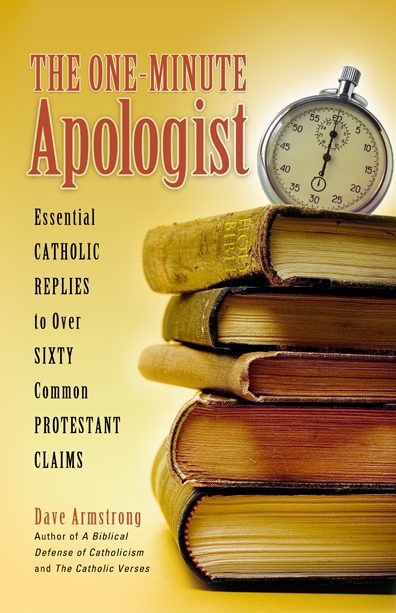
From my book, The One-Minute Apologist (Sophia Institute Press, 2007), pp. 22-23.
*****
The Bible teaches that “when the perfect comes, the imperfect will pass away.” Thus the Catholic Church cannot claim that its ministers today enjoy the gifts and authority that Christ gave to the Apostles.
*****
THE ONE-MINUTE APOLOGIST SAYS:
The idea that spiritual gifts or charisms, or even offices in the Church, were intended for the apostolic age only and not for all times is not taught in the Bible; and furthermore it makes little sense. God gave His gifts to the Church so that it could better fulfill its mission, which continued after the apostolic age.
Some Protestants (called “dispensationalists”) hold that God operates in different ways according to particular ages. A disbelief in miracles and supernatural gifts can also be the result of an anti-supernaturalist or skeptical bent. But the most common argument from Evangelicals in this regard stems from 1 Corinthians 13:8-11. They view the passage, which speaks of supernatural gifts “passing away,” as proof that whatever charisms the apostolic Church may have received from God, these did not carry on through the ages. Certainly the Catholic Church cannot lay claim to them today.
But this is very poor exegesis. The context makes clear that Paul is referring to the next life as the “perfect,” since in 13:12 he states: “For now we see in a mirror dimly, but then face to face. Now I know in part; then I shall understand fully, even as I have been fully understood.” [cf. 1 Jn. 3:2; Rev. 22:4] In other words, the gifts that are part of earthly faith and ministry will not be necessary in heaven.
Those who are known as “cessationists” claim that the “perfect” referred to by Paul is the Bible; but this is merely a preconceived notion imposed onto the text. And why would God remove the blessings for the roles which He had foreordained each of us to play?
Moreover, if these gifts were to cease, why would Paul spend the better part of three chapters (1 Cor. 12-14) defining and elaborating upon them for use in the Church? He urges the Corinthians to “earnestly desire the spiritual gifts” [1 Cor. 13:1] and to “earnestly desire the higher gifts.” [1 Cor. 12:31; cf. 14:39; 1 Thess. 5:19-21] Paul would have been wasting his time if he knew these gifts were about to pass away.
A PROTESTANT MIGHT FURTHER OBJECT:
These gifts were intended only for the earliest period in Christian history, to attest to the gospel and the life, death, and Resurrection of Jesus Christ.
But after that they were not strictly necessary. That goes for offices within the Church, too — so-called “apostolic succession.” Catholics are going beyond the Bible at this point and are simply trying to justify their man-made inventions and traditions.
THE ONE-MINUTE APOLOGIST SAYS:
In this passage St. Paul uses typical Hebrew rhetoric: an exaggerated form of “comparison and contrast.” He means to convey the idea that even important things such as prophecy and knowledge will count for little compared with the glory of being in the presence of God (“face-to-face”). They are not to be sources of pride.
In the surrounding context, Paul casually assumes that gifts would be present in the Church. He writes about “varieties of gifts,” [1 Cor. 12:4] details their distribution by the Holy Spirit (“To each is given the manifestation of the Spirit . . . one and the same Spirit, who apportions to each one individually as he wills”), [1 Cor. 12:7-11] shows that different Christians have different roles and charisms (“Are all teachers? Do all work miracles?”), [1 Cor. 12:27-31] and in chapter 14 provides a detailed exposition of the use of tongues and prophecy in the Church. Nowhere does he ever indicate that this is only a temporary state of affairs.
As for apostolic succession, that has clear biblical warrant, too. It is shown, for example, that the apostles (not Jesus) selected Matthias as the successor of Judas. [Acts 1:20-26] Judas was called a “bishop” (episkopos) in the same passage (1:20), where the Bible specifically describes a process of succession: “For it is written in the book of Psalms . . . ‘His office let another take’” (cf. 1:25: “to take the place in this ministry and apostleship from which Judas turned aside”). If apostles can be replaced in this fashion, and if one was called a bishop, then by logical extension there could be an unbroken apostolic succession of bishops, as the successors of the Apostles.
This conception is present, whole and entire, in the Bible. In fact, in 1 Corinthians 12, St. Paul seems to casually assume that the office of apostle was an ongoing one in the Church. The biblical and historical office of bishop would account for this. The Bible contains all the evidence that one would expect to find in favor of a continuance of all the spiritual gifts, including Church offices.
“1 Corinthians 13:1-13 is obviously directed against a kind of enthusiasm, where zeal for the more spectacular charismata, particularly prophecy, glossalalia and knowledge, had provoked jealousy, arrogance, irritability, and kindred sins. Love had been the loser, and love provides the test (13:4-7). No matter how outstanding the gifts exercised, if they produced a loveless character, Paul counts them of no value whatsoever.”
— James D. G. Dunn (Protestant New Testament Scholar)
***












